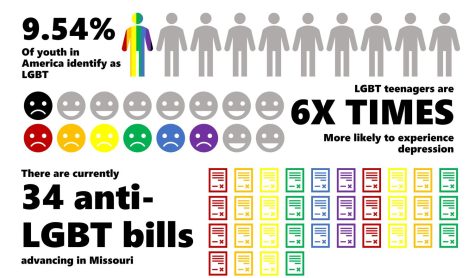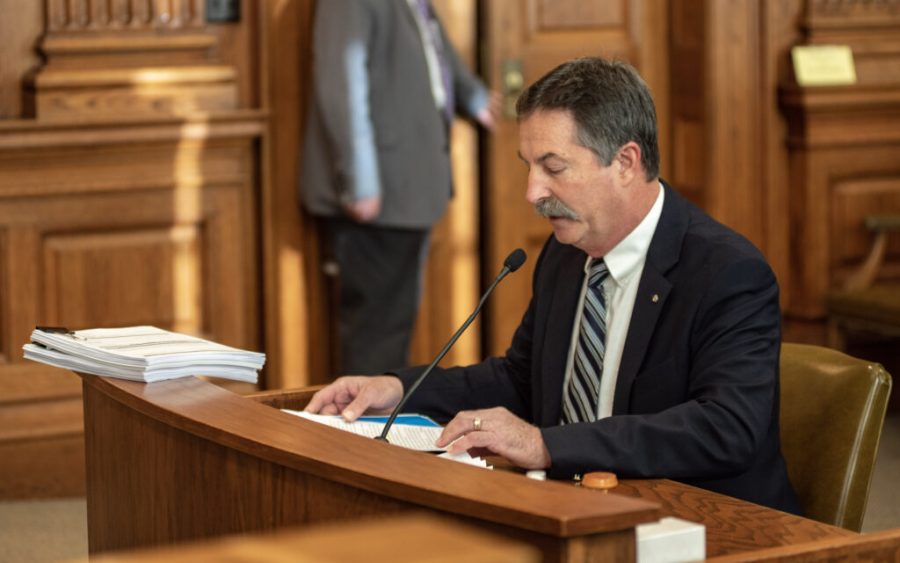Bill Seeks to Hush LGBTQ+ Talking
Proposed Missouri Senate legislation aims to limit classroom discussion
Annelise_Hanshaw/Missouri Independent
State Sen. Mike Moon, R-Ash Grove, introduces his bill opponents are labeling a “Don’t Say Gay” bill before the Senate Education and Workforce Development Committee Tuesday. A thick stack of witness forms sits on the desk.
April 12, 2023
On Feb. 14, the Missouri Senate Bill 134 passed the Education and Workforce Development Committee and it is ready to be debated on the senate floor. It is one of the many proposed bills in Missouri that aim at LGBTQ education. If the bill passes the Senate, it will take effect on Aug. 28, 2023.
The bill establishes the “Vulnerable Child Compassion and Protection Act,” and prevents any “personnel at a public or charter school from discussing gender identity or sexual orientation with a student unless such person is a licensed mental health provider with prior parental permission,” according to the Senate Bill 134 summary. Introduced by republican senator Mike Moon, many from the other side of the political aisle believe the bill has religious motivation.
“I think it’s based on fear and bigotry and hatred,” English teacher Christian Schaeffer said. “It’s members of our state government who wish to eradicate the presence of anything that challenges their beliefs on gender and sexuality.”
The introduction of the bill can also be seen as a republican effort to shape education. There’s a correlation of higher education and political preference, as a report by Manhattan Institute on Feb. 3 this year showed college-educated voters are growing in the democrat party.
“The more education you receive, oftentimes, you see the political spectrum go more left,” Social studies teacher Stephen Meizler said. “It comes down to just the level of education and toleration because we millennials and Gen Z are exposed to this [LGTBQ+ community]. Previous generations were not exposed, so they’re scared of it.”
Regardless of how people feel about the bill, the effect of which may not even be noticed by the Parkway Central staff and students. The bill doesn’t cover components of school curriculum, it solely restricts “encouraging a student under the age of eighteen years old to adopt a gender identity or sexual orientation.”
“Never once has a student asked me and never once have I encouraged the students in any manner of their gender expression or their identity,” Schaeffer said. “That part of the bill is a thing that I would say never happens in our building, and a very broad attack on what people outside of education may incorrectly assume what happens.”
Schaeffer is also the sponsor of Gender Sexuality Alliance (GSA) at Parkway Central. He has been the sponsor for the club for over eight years. He hasn’t encountered any situation where he needs to counsel an LGBT student.
“That is a difficult place for students to be when they are struggling with their identity and perhaps struggling with some discussions at home,” Schaeffer said. “But, the GSA, our role is to provide community for our students, not to provide guidance or counseling.”
The student leader of the GSA, junior Sam Brown and junior Jamie Pettie planned all the activities of the club. They agreed that teacher sponsors don’t lead the discussion, therefore the bill hardly affects them.
“Me and Jamie do most of the talking. So I guess they wouldn’t really get any backlash because they aren’t talking about it,” Brown said. “It’s also after school, so I bet there’s some loophole we could find in it if we really want to do our best.”
The club’s goals are “community, education and activism.” They seek to empower students to represent people in the LGBTQ spectrum, but students in GSA believe there is a lack of LGBTQ information in the current lesson inside the building.
“We teach the history of it [LGBTQ],” Pettie said, “and just the past and what happened because like we’ve mentioned it’s not talked about [in the curriculum enough] and so we’re trying to normalize that.”

Since LGBTQ people are the minority in history, many of them are erased. However, a lot of them made a great impact on history. As the teacher of anthropology, Meizler believed they’re always there as a part of humanity.
“It’s not even necessarily including or adding to, but it’s addressed when it’s necessary. So I don’t shy away from it,” Meizler said. “I teach ancient civilization as well, and world history. And with that, we go over a broad range of cultures and historical people. Some of them have been gay, some of them straight. I do talk about that as a way to highlight the social injustice a government can do to its people, regardless of their identity.”
The bill doesn’t go as far as what a teacher can teach, it does restrict after class discussions. Many see it as a potential damage to the student-teacher relationship. For students, some things are easier to discuss with teachers than parents.
“With a parent, someone you’ve known your whole life, it would be difficult because if they don’t accept me, there’s nothing I really do,” Brown said. “But if a teacher was weird about it, I could just leave and change class or something.”
The teachers, on the other hand, see communication as a part of their job. They could give students a place to be honest about their identity if the student chooses, and taking that away can decrease the chance students feel like they have someone who will listen to them.
“It’s not giving advice. It’s just being there to listen,” Meizler said. “That is the natural progression of things, you find a comfortable person you feel like you’re safe with, you break the barrier there. And then it’s a domino effect afterwards. The issue is, if you never feel like you have that safe person to talk to about it, then you hold it in.”
Without a trusted adult to talk to, many LGBTQ students’ mental health are worse than average teenagers. According to the National Library of Medicine, sexual minority youth are at increased risk for mood disorders and tend to be suicidal.
“I think that this specific bill is targeting and already it’s targeting a group of students who are already on the margins of society,” Schaeffer said. “who already face higher rates of depression and self harm and suicide.”
Putting such restrictions on teachers can be overwhelming, especially when it doesn’t align with the teacher’s personal belief. If the bill passes, many teachers who oppose the bill find it hard to continue to support the students.
“And I’ve heard like some teachers will quit If the bill passes,” Pettie said. “which is, then they don’t have a job. So it’s a very serious thing to think about.”
The nationwide wave of bills restricting academic freedom, which started in Florida, contribute to the increasing teacher shortage. The bill specifically mentioned parents have the right to bring civil action against schools, which can cause teachers to lose their license.
“Already, we live in a very, very litigious world in which lawsuits are constantly being thrown out for every little thing,” Meizler said. “Teachers are already scared to death about lawsuits for slipping up and making mistakes. So if you add this on top of it, that you have to out students to their parents within 24 hours, or you lose your license, that’s going to stop any relationship between teachers and students.”
Parkway Central is a diverse community, with the school district encouraging students and teachers to embrace different kinds of stories and different kinds of characters. There’s always trust between parents and teachers.
“I have to trust the parents of Parkway school district to trust the teachers that teach their students.” Schaeffer said. “And I have to trust that the parents of Parkway school districts do not want their students attending a place that limits their academic freedom. And that limits the whole beautiful, complex threads of humanity.”
While teachers and state government have different political views, the teachers will ensure students get the support they need as long as they’re in school.
“The bill is never going to keep the adults in the building from seeing and supporting and seeking to understand our students,” Schaeffer said. “No bill can get in the way of the good adults in this building from supporting the students who need it.”



